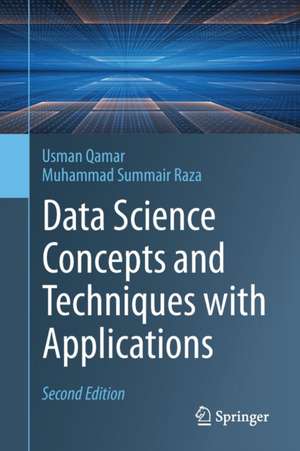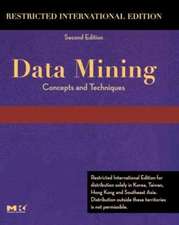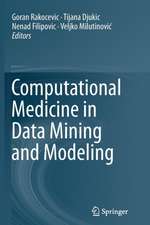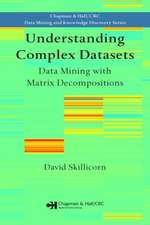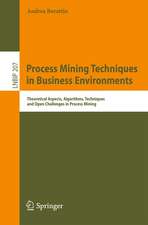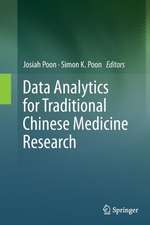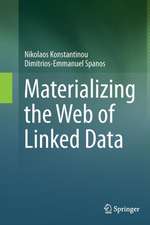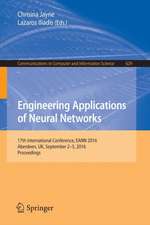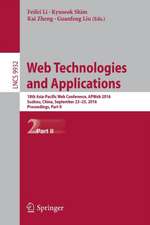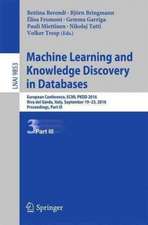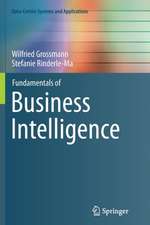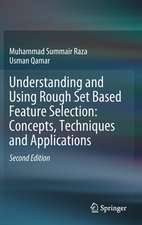Data Science Concepts and Techniques with Applications
Autor Usman Qamar, Muhammad Summair Razaen Limba Engleză Paperback – 4 apr 2023
The chapters of this book are organized into three parts: The first part (chapters 1 to 3) is a general introduction to data science. Starting from the basic concepts, the book will highlight the types of data, its use, its importance and issues that are normally faced in data analytics, followed by presentation of a wide range of applications and widely used techniques in data science. The second part, which has been updated and considerably extended compared to the first edition, is devoted to various techniques and tools applied in data science. Its chapters 4 to 10 detail data pre-processing, classification, clustering, text mining, deep learning, frequent pattern mining, and regression analysis. Eventually, the third part (chapters 11 and 12) present a brief introduction to Python and R, the two main data science programming languages, and shows in a completely new chapter practical data science in the WEKA (Waikato Environment for Knowledge Analysis), an open-source tool for performing different machine learning and data mining tasks. An appendix explaining the basic mathematical concepts of data science completes the book.This textbook is suitable for advanced undergraduate and graduate students as well as for industrial practitioners who carry out research in data science. They both will not only benefit from the comprehensive presentation of important topics, but also from the many application examples and the comprehensive list of further readings, which point to additional publications providing more in-depth research results or provide sources for a more detailed description of related topics.
"This book delivers a systematic, carefully thoughtful material on Data Science." from the Foreword by Witold Pedrycz, U Alberta, Canada.
| Toate formatele și edițiile | Preț | Express |
|---|---|---|
| Paperback (2) | 302.59 lei 38-44 zile | |
| Springer Nature Singapore – 9 iun 2021 | 302.59 lei 38-44 zile | |
| Springer International Publishing – 4 apr 2023 | 474.97 lei 6-8 săpt. |
Preț: 474.97 lei
Preț vechi: 593.71 lei
-20% Nou
Puncte Express: 712
Preț estimativ în valută:
90.89€ • 95.98$ • 75.64£
90.89€ • 95.98$ • 75.64£
Carte tipărită la comandă
Livrare economică 13-27 ianuarie 25
Preluare comenzi: 021 569.72.76
Specificații
ISBN-13: 9783031174414
ISBN-10: 3031174410
Pagini: 474
Ilustrații: XXIV, 474 p. 70 illus. in color.
Dimensiuni: 155 x 235 mm
Greutate: 0.69 kg
Ediția:2nd ed. 2023
Editura: Springer International Publishing
Colecția Springer
Locul publicării:Cham, Switzerland
ISBN-10: 3031174410
Pagini: 474
Ilustrații: XXIV, 474 p. 70 illus. in color.
Dimensiuni: 155 x 235 mm
Greutate: 0.69 kg
Ediția:2nd ed. 2023
Editura: Springer International Publishing
Colecția Springer
Locul publicării:Cham, Switzerland
Cuprins
1. Introduction.- 2. Applications of Data Science.- 3. Widely Used Techniques in Data Science Applications.- 4. Data Preprocessing.- 5. Classification.- 6. Clustering.- 7. Text Mining.- 8. Deep Learning.- 9. Frequent Pattern Mining.- 10. Regression Analysis.- 11. Data Science Programming Language.- 12. Practical Data Science with WEKA.
Notă biografică
Usman Qamar has over 15 years of experience in data engineering and decision sciences both in academia and industry. He is currently Tenured Professor of Data Sciences at the National University of Sciences and Technology (NUST) Pakistan and director of Knowledge and Data Science Research Centre, a Centre of Excellence at NUST, Pakistan. He has authored nearly 200 peer-reviewed publications and has also received multiple research awards.
Muhammad Summair Raza currently associated with the Virtual University of Pakistan as an assistant professor. He has published various papers in international-level journals and conferences with a focus on rough set theory. His research interests include feature selection, rough set theory, trend analysis, software design, software architecture, and non-functional requirements.
Muhammad Summair Raza currently associated with the Virtual University of Pakistan as an assistant professor. He has published various papers in international-level journals and conferences with a focus on rough set theory. His research interests include feature selection, rough set theory, trend analysis, software design, software architecture, and non-functional requirements.
Textul de pe ultima copertă
This textbook comprehensively covers both fundamental and advanced topics related to data science. Data science is an umbrella term that encompasses data analytics, data mining, machine learning, and several other related disciplines.
The chapters of this book are organized into three parts: The first part (chapters 1 to 3) is a general introduction to data science. Starting from the basic concepts, the book will highlight the types of data, its use, its importance and issues that are normally faced in data analytics, followed by presentation of a wide range of applications and widely used techniques in data science. The second part, which has been updated and considerably extended compared to the first edition, is devoted to various techniques and tools applied in data science. Its chapters 4 to 10 detail data pre-processing, classification, clustering, text mining, deep learning, frequent pattern mining, and regression analysis. Eventually, the third part (chapters 11 and 12) present a brief introduction to Python and R, the two main data science programming languages, and shows in a completely new chapter practical data science in the WEKA (Waikato Environment for Knowledge Analysis), an open-source tool for performing different machine learning and data mining tasks. An appendix explaining the basic mathematical concepts of data science completes the book.
This textbook is suitable for advanced undergraduate and graduate students as well as for industrial practitioners who carry out research in data science. They both will not only benefit from the comprehensive presentation of important topics, but also from the many application examples and the comprehensive list of further readings, which point to additional publications providing more in-depth research results or provide sources for a more detailed description of related topics.
The chapters of this book are organized into three parts: The first part (chapters 1 to 3) is a general introduction to data science. Starting from the basic concepts, the book will highlight the types of data, its use, its importance and issues that are normally faced in data analytics, followed by presentation of a wide range of applications and widely used techniques in data science. The second part, which has been updated and considerably extended compared to the first edition, is devoted to various techniques and tools applied in data science. Its chapters 4 to 10 detail data pre-processing, classification, clustering, text mining, deep learning, frequent pattern mining, and regression analysis. Eventually, the third part (chapters 11 and 12) present a brief introduction to Python and R, the two main data science programming languages, and shows in a completely new chapter practical data science in the WEKA (Waikato Environment for Knowledge Analysis), an open-source tool for performing different machine learning and data mining tasks. An appendix explaining the basic mathematical concepts of data science completes the book.
This textbook is suitable for advanced undergraduate and graduate students as well as for industrial practitioners who carry out research in data science. They both will not only benefit from the comprehensive presentation of important topics, but also from the many application examples and the comprehensive list of further readings, which point to additional publications providing more in-depth research results or provide sources for a more detailed description of related topics.
"This book delivers a systematic, carefully thoughtful material on Data Science." from the Foreword by Witold Pedrycz, U Alberta, Canada.
Caracteristici
Comprehensively covers both fundamental and advanced topics related to data science Presents data pre-processing, classification, clustering, text and pattern mining, deep learning, regression analysis Includes an introduction to the open source tool WEKA, the Waikato Environment for Knowledge Analysis
